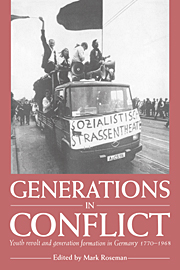Book contents
- Frontmatter
- Contents
- Contributors
- Acknowledgements
- List of abbreviations
- 1 Introduction: generation conflict and German history 1770–1968
- 2 The ideal of youth in late eighteenth-century Germany
- 3 Young Germans and Young Germany: some remarks on the history of German youth in the late eighteenth and in the first half of the nineteenth century
- 4 The battle for the young: mobilising young people in Wilhelmine Germany
- 5 Jewish politics and generational change in Wilhelmine Germany
- 6 The ‘front generation’ and the politics of Weimar Germany
- 7 The New Woman and generation conflict: perceptions of young women's sexual mores in the Weimar Republic
- 8 Generations of German historians: patronage, censorship and the containment of generation conflict 1918–1945
- 9 Gender, generation and politics: young Protestant women in the final years of the Weimar Republic
- 10 The Hitler Youth generation and its role in the two post-war German states
- 11 The BDM generation: a female generation in transition from dictatorship to democracy
- 12 A generation twice betrayed: youth policy in the transition from the Third Reich to the Soviet Zone of Occupation (1945–1946)
- 13 The generation conflict that never was: young labour in the Ruhr mining industry 1945–1957
- 14 The German Kriegskinder: origins and impact of the generation of 1968
- Index
6 - The ‘front generation’ and the politics of Weimar Germany
Published online by Cambridge University Press: 19 October 2009
- Frontmatter
- Contents
- Contributors
- Acknowledgements
- List of abbreviations
- 1 Introduction: generation conflict and German history 1770–1968
- 2 The ideal of youth in late eighteenth-century Germany
- 3 Young Germans and Young Germany: some remarks on the history of German youth in the late eighteenth and in the first half of the nineteenth century
- 4 The battle for the young: mobilising young people in Wilhelmine Germany
- 5 Jewish politics and generational change in Wilhelmine Germany
- 6 The ‘front generation’ and the politics of Weimar Germany
- 7 The New Woman and generation conflict: perceptions of young women's sexual mores in the Weimar Republic
- 8 Generations of German historians: patronage, censorship and the containment of generation conflict 1918–1945
- 9 Gender, generation and politics: young Protestant women in the final years of the Weimar Republic
- 10 The Hitler Youth generation and its role in the two post-war German states
- 11 The BDM generation: a female generation in transition from dictatorship to democracy
- 12 A generation twice betrayed: youth policy in the transition from the Third Reich to the Soviet Zone of Occupation (1945–1946)
- 13 The generation conflict that never was: young labour in the Ruhr mining industry 1945–1957
- 14 The German Kriegskinder: origins and impact of the generation of 1968
- Index
Summary
Until 1930 we all failed to appreciate fully the First World War's political legacy: the decimation of the younger generation in the war. The volunteers of 1914, who had wanted an ethical revival of the nations, lay for the most part under cold earth all over Europe. They could not be replaced. The loss of young men was so enormous that within twelve years the post-war generation formed the majority of Germany's male voters.
Thus Heinrich Brüning looked back, in his memoirs, at the impact of the front generation on the politics of the Weimar Republic. Brüning was deeply influenced by his experiences in uniform during the First World War, in particular by his membership in an elite machine-gun unit and by the scenes he had witnessed as the war came to an end. Indeed, this provided the starting-point for his memoirs, which open with comments about his position vis-à-vis ‘my generation’. While Brüning reflected the widely held conviction that the men who had fought in the war formed a special generation, his understanding of their role in public life was in some respects remarkably perceptive. True, he reproduced the contemporary rhetoric about the ‘volunteers of 1914’ who ‘lay for the most part under cold earth all over Europe and could not be replaced’ yet he displayed an appreciation that it was not the generation ‘decimated in the First World War’ but the post-war generation which proved most difficult for Weimar democracy to accommodate. In this way Brüning's observations, written down half a century after the Armistice of November 1918, neatly frame a discussion of the front generation and the politics of Weimar Germany.
- Type
- Chapter
- Information
- Generations in ConflictYouth Revolt and Generation Formation in Germany 1770–1968, pp. 121 - 136Publisher: Cambridge University PressPrint publication year: 1995
- 3
- Cited by

